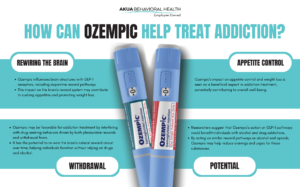Ozempic, an FDA-approved medication used to treat diabetes, has been trending among celebrities and influencers on social media over the past year as the “miracle weight loss drug.” Recent research suggests that this drug may target the same receptors in the brain as it does in the pancreas, acting on the brain’s reward dopamine center, which plays a pivotal role in addiction.
Currently, there are at least nine phase 2 clinical trials underway or planned that are testing where this “magical” weight loss can help patients curb their addiction to alcohol, opioids, alcohol, and cocaine. Animal studies have been promising, and if the results of these new human trials are also promising, addiction science may have another “Prozac” moment.
Unfortunately, this medication will most likely come at a high cost and may be a barrier for many people seeking treatment (especially if it is not FDA-approved and is used off-label, which parallels the current relationship between Ozempic and weight loss).
When asked how he looked “fit, ripped and healthy,” Elon Musk tweeted that he was taking Wegovy. The hashtag #Ozempic On Tik Tok has been viewed over 273 million times, with people alternately expressing shock over their supposed medication-induced weight loss and swapping stories about side effects.
What is Ozempic?
Ozempic is the brand name for semaglutide, a glucagon-like peptide–1 (GLP-1) agonist that works on the pancreas. GLP-1 is a hormone normally produced by the pancreas in response to food, so after you eat a meal, this is released within 15-30 minutes and tells the pancreas to start making insulin. For individuals with diabetes, this hormone helps release insulin to regulate your blood sugars. Ozempic is often prescribed off-label to help with weight loss since it suppresses your appetite by tricking your body into believing it has already consumed a meal. Wegovy, approved in 2021, contains the same active ingredient, semaglutide, as Ozempic but at a higher dosage and is FDA-approved for weight loss in people with a body mass index of 30 or above or people with a BMI of 27 or above who also have a weight-related medical condition. They are both once-weekly injectable medications. It is important to note that these medicines are quite expensive if they are not covered by insurance and can cost from $900 to $1,400 a month, not to mention the potential side effects, including dehydration, nausea, diarrhea, stomach pain, and pancreatitis.
What is the relationship between weight loss and addiction?
Food nourishes our bodies so we can live and thrive throughout the day. However, food also triggers our dopamine reward system in the brain. Many areas in our brains are involved in our reward pathways, which drive us to pursue pleasurable activities, such as eating tasty food, hanging out with friends, or exercising.
When these reward areas are activated, dopamine is released, which is responsible for the pleasurable feelings we experience from these activities. Alcohol and drugs also hijack the brain’s reward system. When these substances leave our bodies, we crave more dopamine and pleasure, which leads us to experience cravings and urges, which can result in further drug use and addiction.
We crave sugar and long runs in the same way that we crave alcohol and cocaine; the difference is the former can be healthy, and the latter can be life-threatening. Of note, because of these powerful reward pathways in our brains, we can become addicted to food, exercise, sex, and other pleasurable activities, which can result in negative consequences, poor health, and dangerous behaviors. So, how does this relate to Ozempic?
How can Ozempic help treat addiction?

Research has shown that several structures in the brain also produce GLP-1 or carry receptors for this hormone, including brain areas involved in our dopamine reward pathways. Researchers believe that Ozempic helps curb appetites and, thereby, weight loss in people because it also works on the brain’s reward system by acting on the GLP-1 pathways in the brain. Because of this relationship between GLP-1 receptors, the brain’s reward pathways, and Ozempic, it makes sense why individuals with alcohol and drug addictions can potentially benefit from Ozempic. Ozempic would act on the same reward pathways as alcohol and opioids, potentially curbing cravings and urges for these substances.
Another logical explanation of why Ozmepic may be favorable for addiction treatment has to do with withdrawal and relapse. Drug-seeking behaviors are not only driven by the pleasurable reward but also the fear of bad feelings and side effects associated with withdrawal. In this situation, the brain sees drugs and alcohol as a physiological need, much like food. GLP-1 agonists such as Ozempic can interfere with this association and, over time, re-wire the brain’s natural reward circuit to function without drugs and alcohol.
Taking a look at the research
- Studies in rodents and primates have supported GLP-1 agonists to diminish the desire for substances such as alcohol, fentanyl, nicotine, and heroin. “Clinical psychiatrist Anders Fink-Jensen of the University of Copenhagen and colleagues demonstrated that the drugs work in an incorrigible group of drinkers, the monkeys living on the islands of St. Kitts and Nevis in the Caribbean. These rowdy primates are notorious for heavy consumption of alcoholic drinks, which they often swipe from tourists”.
- “A team led by Luba Yammine, a clinician, and researcher at the University of Texas Health Science Center at Houston, found in 2021 that 46% of patients who wore nicotine patches and received weekly injections of exenatide, a first-generation GLP-1 analog, stopped smoking, versus 27% of people who relied only on the patches.”
- Another study with 127 people with alcohol use disorder who were given exenatide, a GLP-1 agonist, displayed less activity in the brain’s reward centers on fMRI when shown pictures of alcohol. However, only participants with obesity who were given exenatide ended up drinking significantly less.
There is still much research to be done to determine this medication’s effectiveness on individuals with addiction and whether it is safe enough to come to market. Many addiction professionals worry about the potential side effects of using Ozempic for addiction; besides the gastrointestinal side effects and high cost of the drug, will this drug blunt the effects of natural pleasurable activities, leading people to experience anhedonia, depression, and suicidal thoughts?
What about the long-term safety of this medication, as Ozempic only hit the market in 2021? Although this medication seems to be promising on some front of addiction treatment, there is still a long road ahead to figure out the rest of the puzzle.




